Order of Military Merit, Type III, Commander Cross
SKU: 01.WUT.0106.303.01
Estimated market value:
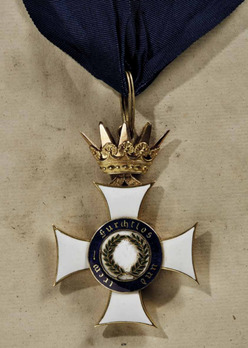
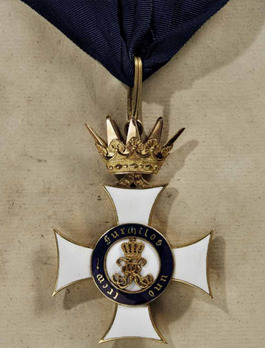
Estimated market value:
Attributes
Physical Description
A George’s cross with inwardly curved arms, constructed of gold and enamel. On top of the cross sits a mobile golden crown, attached via two curved links. The cross arms are enamelled in white with narrow golden edges. The obverse centre medallion is enamelled in white and features a green enamelled laurel wreath with golden borders, tied by a golden ribbon at the bottom. The medallion ring is enamelled in blue with narrow golden borders and features the golden inscription ‘FURCHTLOS UND TREW’ (‘fearless and loyal’). The reverse is similar, except that the centre medallion features the crowned golden monogram ‘KR’. On a loop for suspension, on a yellow ribbon with black side stripes.
History
The Order of Military Merit was originally established as the Militär-Carls-Orden (Military Order of Carl) by Karl Eugen, Duke of Württemberg, on February 11, 1759. On November 11, 1806, the decoration was reorganised and renamed the Order of Military Merit by King Friedrich I. It was one of Imperial Germany’s oldest military decorations.
The decoration was conferred upon officers from Württemberg and its allied states who demonstrated bravery in combat or performed deeds of outstanding merit.
The order's grades and attributes were changed multiple times throughout its history. The monogram on the obverse of the award denotes the king who was in power when the decoration was awarded.
The order originally consisted of three grades, Grand Cross, Commander’s Cross, and Knight’s Cross. In 1809, the grade of I Class Commander’s Cross was added. Recipients of the Commander’s also received a gilded dagger or sabre with an image of the Commander Cross on the grip. The grade was discontinued in 1819.
In 1818, the order statutes were renewed and the cross was redesigned. In addition, the colour of the ribbon was changed from yellow and black to blue. The blue ribbon was used until 1914 when it was replaced with the original yellow and black ribbon. At this time, it was determined that civilian recipients of the order were to be made members of the aristocracy. However, these recipients were stripped of their nobility in 1913.
In 1858, the embroidered Grand Cross Breast Star was replaced with a metal design.
In 1870, a crown was added to the top of the Knight’s Cross. The grades of Grand Cross and Commander’s Cross already featured crowns, and in 1914, the crowns were removed from all three grades.
In 1917, it was determined that recipients could wear an enamelled wreath on the order ribbon in place of the decoration.
An estimated 95 Grand Crosses, 214 Commander Crosses, and 3,128 Knight’s Crosses were conferred. The majority of the awards were issued during the First World War.
Following the defeat of Germany in the First World War, the order became obsolete.
The Commander Cross (1914-1918 version) was also produced in silver gilt, although they were not official award pieces.
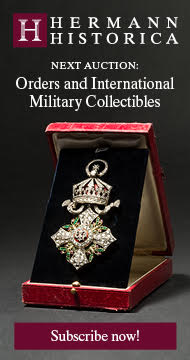
Versions
$4,000 USD
Gold/Enamelled
Obv: FURCHTLOS UND TREW Rev: W
52x52mm
25 were awarded.
$4,000 USD
Gold/Enamelled
Obv: FURCHTLOS UND TREW Rev: KR
52x52mm
65 were awarded.
$3,000 USD
Gold/Enamelled
Obv: FURCHTLOS UND TREW Rev: WR
57x57mm
27 were awarded.
$2,500 USD
Gold/Enamelled
Obv: FURCHTLOS UND TREW Rev: WR
52x51mm
19 were awarded.


Comments
Sign in to comment and reply.
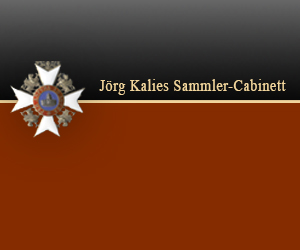
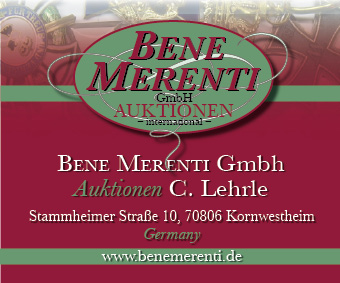
Scroll Top